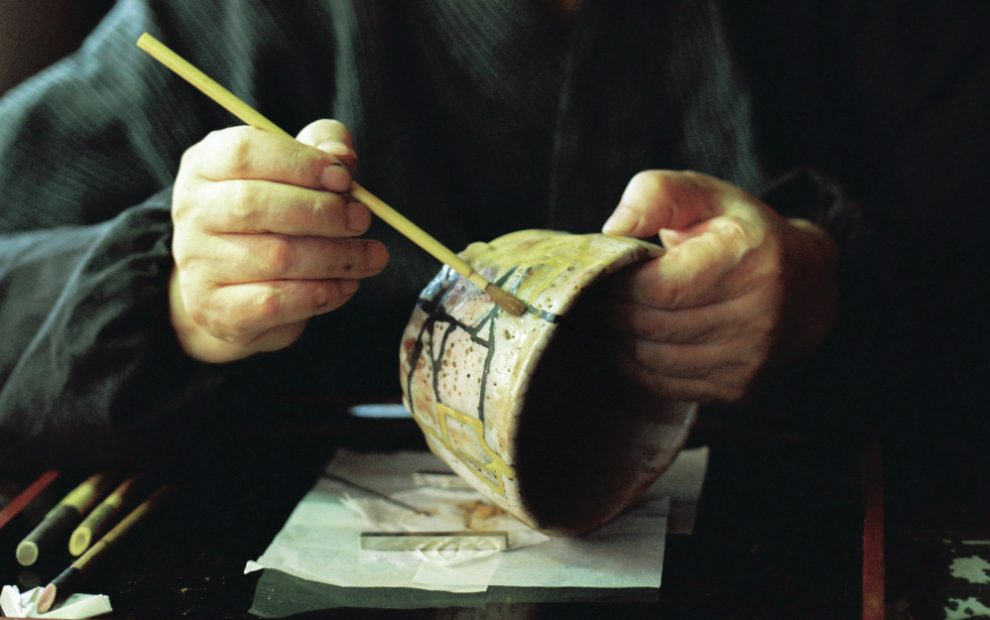Broken can be beautiful too.
This is the lesson of kintsugi, an ancient Japanese art form that gives new life to broken pottery. The word kintsugi means “to patch with gold.” An artist practicing kintsugi takes shards of injured pottery and pieces them back together using a mixture of lacquer and powdered gold. The result is a resurrected vessel that retains much of its original form but now shines with metallic seams that signal: I am strong. I am resilient. I am healed.
Brokenness is not a blemish in kintsugi. It becomes an integral part of the vessel’s story, intentionally left visible after repair and honored with the finest metallic materials. In fact, tradition says the vessel is even more valuable after the break and ritual repair.
Many outside the pottery world latch onto kintsugi as a metaphor for life. Who among us hasn’t faced hardships that chip away at our sense of self? What would it be like if we saw those cracks—or even full-on breaks—as opportunities to become whole again, stronger than ever before?
This metaphor came to mind as I prayed through the first two chapters of the Book of Job. After years of prosperity, Job suddenly finds himself thrust into unimaginable tragedy: Outside forces kill all his children, servants, and livestock. Then Satan inflicts Job’s body with loathsome sores.
Job’s entire life breaks down in a matter of minutes. Job now sits among the ashes. Shards of broken pottery litter the ground around him. No one could have blamed him for giving up on God—and himself—right then and there. Human beings can only endure so much suffering, right?
The man with a shattered heart musters the strength to start his own healing, one scrape at a time.
Instead, Job persists. He picks up a piece of broken pottery—maybe the jagged handle of a cup or the sharp base of a plate—and begins to scrape at the sores covering his body. As hard clay digs into his tender flesh, Job keeps his focus on the age-old truth: Wounds must be opened in order to heal.
The pieces of pottery carry a healing quality in their broken state. The same is true for Job. The man with a shattered heart musters the strength to start his own healing, one scrape at a time. Nothing about this is easy. Job falls into deep despair in the days that follow. He knows he cannot fully heal himself on his own. Job is like the scattered shards of pottery: still with purpose but in need of some help.
Soon three friends—Eliphaz, Bildad, and Zophar—leave their homes to join Job on the ground. For seven days and seven nights, the four friends sit among the ashes together. No one offers advice. No one mutters platitudes. No one challenges Job—that comes in later chapters. For now, no one speaks at all.
Eliphaz, Bildad, and Zophar act as the gold sealant in kintsugi during the week of silence. They seal Job back together with their presence, strengthening him for the difficult road ahead. These friends do not shy away from brokenness. They sit among it. They respect the realness of Job’s jagged story. They help him heal with nothing more—and nothing less—than their very selves.
These friends do not shy away from brokenness. They sit among it.
Advertisement
We are called to do the same.
The metaphor of kintsugi models a way of being this Lenten season. We are called to sit among the ashes with our friends. We are called to think creatively about what it means to be present during a pandemic. Together with Christ, we are called to be the gold sealant for the many among us who feel broken.
This article also appears in the February 2021issue of U.S. Catholic (Vol. 86, No. 2, page 7). Click here to subscribe to the magazine.
Image: Unsplash/Motoki Tonn














Add comment